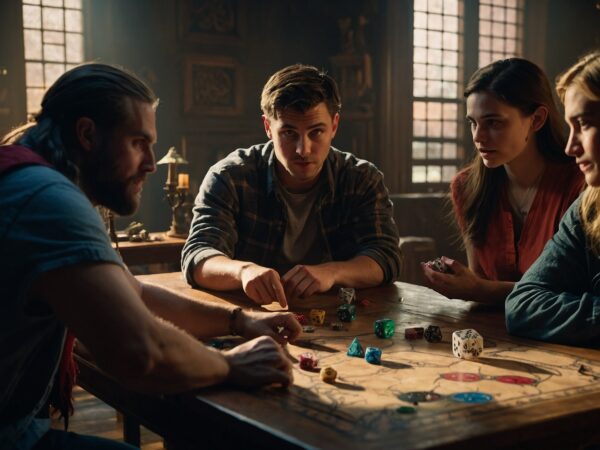Being a Dungeon Master (DM) in Dungeons & Dragons is one of the most rewarding roles in tabletop gaming, but it can also be a daunting task. As a DM, you’re responsible for guiding the players through a world of your creation, crafting stories, managing rules, and keeping the game moving. Learning how to be a great Dungeon Master starts first and foremost with loving the game. Whether you’re a first-time DM or looking to level up your skills, this guide will help you master the art of running a successful DnD campaign.
What is a Dungeon Master?
A Dungeon Master (DM) is the person who runs and oversees a game of Dungeons & Dragons (D&D). As the DM, they act as the storyteller, referee, and narrator, guiding the players through the game’s world and adventures. The role is crucial because the DM controls everything that the players interact with, from the environment to the characters they meet and the challenges they face.
Key Responsibilities of a Dungeon Master:
- Creating and Describing the World: The DM builds the game’s setting, whether it’s a sprawling city, a dark dungeon, or a magical forest. They describe the sights, sounds, and events that the players encounter as they journey through the story.
- Running the Story: The DM crafts the narrative and plot of the campaign, often tailoring it to the characters and decisions of the players. They present quests, puzzles, and mysteries for the players to solve.
- Controlling Non-Player Characters (NPCs): The DM plays the roles of all the characters the players meet in the game, from friendly villagers to fearsome monsters. The DM voices these characters, decides how they interact with the players, and manages their actions during encounters.
- Refereeing the Rules: The DM ensures that the rules of D&D are followed, making fair judgments on how actions and events play out based on dice rolls and player choices. They might also adjust rules for the sake of fun or narrative flow.
- Guiding Combat: In battle, the DM controls enemies and monsters, determining their actions, strategies, and how the fight plays out. The DM ensures combat stays engaging and balanced.
Why the DM Role is Important
The Dungeon Master is essentially the backbone of any D&D game. They create an immersive world for the players and ensure that the story flows smoothly. While the players control their individual characters, the DM controls the rest of the universe, making the game more dynamic, creative, and fun. Being a DM is both challenging and rewarding, allowing the person to shape the story and help create memorable experiences for the group.

What Makes a Great Dungeon Master?
A great Dungeon Master (DM) is someone who makes the game fun, immersive, and engaging for everyone at the table. The key to being a successful DM lies in striking a balance between telling a compelling story and ensuring that the players are having a great time. Flexibility is crucial—no matter how much planning you do, players will often take the story in unexpected directions. Being able to adapt on the fly while keeping the narrative cohesive is what separates a good DM from a great one. This flexibility allows for player creativity, making them feel like their decisions truly impact the game world.
Equally important is the ability to create an immersive experience. Through vivid descriptions, memorable characters, and dynamic environments, a great DM brings the game world to life. NPCs should feel like real people, with personalities and quirks that engage the players. A great DM also understands pacing, keeping the game moving to maintain excitement without rushing through important moments. Above all, the goal is to foster an environment where players can laugh, strategize, and fully inhabit their characters, making the campaign an enjoyable and memorable experience for everyone involved.
1. Know the Rules, But Be Flexible
While it’s important to have a good understanding of D&D’s rules, being a great Dungeon Master isn’t about memorizing every detail of the rulebook. The key is to know the rules well enough to run a smooth game, but also to be flexible when the situation calls for it.
- Start with the Core Rules: Familiarize yourself with the basics found in the Player’s Handbook, the Dungeon Master’s Guide, and the Monster Manual. If a rule stumps you mid-session, make a quick ruling and move on. You can always revisit the rule after the session.
- Rule of Cool: Sometimes, bending the rules a little to make a scene more fun or exciting is worth it. If a player comes up with a creative solution to a problem that isn’t exactly by the book but sounds awesome, consider letting it happen. D&D is about telling a great story, and sometimes that story is more important than sticking to the rules.
2. Preparation is Key
Being prepared is one of the most important factors in running a successful campaign. Good preparation doesn’t mean you need to write a novel for every session, but having a solid understanding of what’s coming next will help you feel more confident and organized.
- Plan the Big Picture: Before the campaign starts, outline the major story arcs, key NPCs (Non-Player Characters), and locations. Think about the overall plot: What is the main goal of the campaign? What are the players working toward? You don’t need to know every detail, but having a loose roadmap will guide your sessions.
- Prep Session-Specific Content: For each game session, prepare the encounters, key dialogue points, and any dungeons or cities the players will visit. Create a few possible scenarios based on what you think the players might do.
- Keep Notes: Keep track of what happens in each session. This helps you remember key plot points and player decisions that can impact future events. Tools like DM notebooks, campaign planning apps, or simple note-taking apps are your best friends.
3. Create a Living, Breathing World
One of the greatest joys for players is feeling like their characters are exploring a world that feels alive. As the DM, you can create this feeling by fleshing out the world with rich details and consistent interactions.
- Describe the World Vividly: Take a few moments to describe the sights, sounds, and smells of new places. Is the market bustling with the sound of vendors shouting, or is the forest eerily quiet with the crackle of leaves underfoot? Using sensory descriptions helps players imagine the world and engage more fully with the setting.
- Make NPCs Memorable: NPCs aren’t just background characters—they can become beloved (or hated) figures in the story. Give them personalities, quirks, and motivations. For example, a grumpy shopkeeper might always overcharge the players, or a charming bard might offer riddles instead of directions.
- Show the Consequences of Player Actions: Whether it’s the outcome of a battle or the decision to help (or not help) an NPC, show the players that their choices matter. Did they save a village from goblins? Maybe the villagers will throw them a feast or grant them favors in the future. Did they insult a local lord? Expect the guards to keep a close eye on them.
4. Master the Art of Pacing
Pacing is crucial for keeping players engaged. A well-paced game keeps things moving without feeling rushed, balancing moments of action with roleplay and exploration.
- Avoid Long Downtimes: Try not to let the game bog down with too much indecision or excessive planning. If the players are stuck, give them a nudge with hints, NPC advice, or environmental clues.
- Switch Up the Focus: A good session has a mix of exploration, roleplay, and combat. Too much of one type of gameplay can cause fatigue. If your party just finished an intense dungeon crawl, give them time to rest in town and interact with NPCs. Conversely, if they’ve been socializing for a while, throw a random combat encounter their way.
- Don’t Fear Improvisation: Even the best-prepared DM will have moments when the players do something unexpected. Embrace it! Use the story framework you’ve prepared and weave their decisions into the world. Improvisation is one of the most valuable skills a DM can develop, and it gets easier with practice.
5. Engage All of Your Players
Every player is different. Some love combat, some are into roleplaying, and others enjoy solving puzzles. Your job as the DM is to balance the game to ensure everyone gets a chance to shine.
- Know Your Players’ Interests: Pay attention to what excites each player and try to incorporate those elements into your sessions. If one player loves intricate combat, design some challenging tactical encounters. If another player enjoys social interactions, give them opportunities to charm NPCs or broker peace between warring factions.
- Encourage Shy Players: Some players may be hesitant to speak up or get involved. Encourage them by asking questions about their character’s actions or giving them moments to take the lead in the story. It’s important to create an inclusive environment where everyone feels comfortable participating.
- Create Moments for Individual Characters: While the campaign focuses on the party as a whole, giving individual characters moments to shine (based on their backstories, class abilities, or personal goals) can make the game feel more personal and engaging.
6. Maintain a Fun and Fair Atmosphere
As a Dungeon Master, you’re the referee of the game, ensuring the rules are followed while keeping the mood light and fun.
- Be Fair: Your players rely on you to be an impartial judge. Make rulings that are consistent and in line with the rules or established precedents. Favoring one player over another can lead to frustration and imbalance in the group.
- Encourage Collaboration: Dungeons & Dragons is a team game, so encourage the players to work together to solve problems, strategize in combat, and make decisions. If one player dominates, gently guide the group back to working as a cohesive unit.
- Remember, It’s a Game: Sometimes the dice don’t roll in your favor, and sometimes the story takes a different direction than you planned. The most important thing is that everyone is having fun. Keep the atmosphere light, and don’t be afraid to laugh off mistakes or unlucky dice rolls.
7. Keep Combat Interesting
Combat can be one of the most exciting parts of D&D, but if it drags on too long or becomes repetitive, players can lose interest.
- Use the Environment: Make combat more dynamic by incorporating environmental features. Maybe there’s a crumbling bridge over a chasm, a room full of burning torches that can be used as improvised weapons, or a storm that’s impacting visibility.
- Mix Up Encounters: Not every fight needs to be a simple brawl to the death. Introduce different types of encounters—fights with multiple objectives, such as defending a location or disarming traps while battling enemies, can add depth and excitement.
- Scale Combat Appropriately: Balance encounters so they’re challenging but not overwhelming. If an encounter is dragging, consider tweaking the enemy’s health or actions behind the scenes to speed things up. On the flip side, if the players are breezing through every fight, add in tougher foes or unexpected reinforcements.
8. Learn from Your Players
Every table is different, and your players are one of your best resources for improving as a DM. After each session, consider asking for feedback. What did they enjoy? Was there anything that could have been better?
Pay attention to their reactions during the game—if they’re excited, engaged, and having fun, you’re doing it right. If they seem bored or frustrated, adjust future sessions to better fit their preferences.
Onward to Adventure!
Becoming a great Dungeon Master takes practice, patience, and a willingness to learn from every session. By preparing ahead, embracing improvisation, engaging your players, and focusing on storytelling, you’ll create memorable experiences for both you and your players. Remember, at its heart, D&D is about having fun—so keep the game lighthearted, roll with the unexpected, and enjoy the journey. After all, it’s not just about the destination, but the stories you create along the way.
Looking for more tips?
Check out our guides on World-Building for DMs and Creating Memorable NPCs to take your campaigns to the next level!








